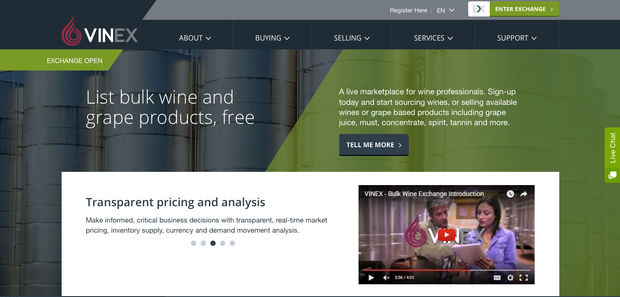
Global trading platform for bulk-wine industry launched
This week sees the launch of a new web-based exchange for the global bulk-wine industry.
This week sees the launch of a new web-based exchange for the global bulk-wine industry.
The London-based Vinex exchange enables buyers and sellers to trade wine and other grape-derived product through a proprietary trading platform.
Buyers on Vinex will be able to view pricing, market insights and analysis, and list their specific sourcing requirements, while sellers can list and offer samples of their wines.
The platform offers multiple trade methods for buyers and sellers to use including auction, tender, fixed-price and swap offer.
Other features include a pre-harvest forward contract option enabling buyers to secure supply from the next vintage while hedging against price movements or adverse market supply conditions.
Trades are conducted anonymously to ensure negotiations are completed fairly and without bias.
The multi-lingual platform also provides a range of tools to enable traders to compare prices, freight and currencies and to calculate the value of a contract within a range of market variables.
Vinex has been designed in consultation with a range of industry executives over the last 18 months.
Managing director Denys Hornabrook has over 20 years' experience in international wine trading and business development.
"The industry has seen little change in the way wines are traded for decades and yet there's been really significant growth in demand for in-market bottlings in the last eight years," Hornabrook said.
"There's now real pressure on the sector to look for more efficient ways to receive market information and view wine inventory levels in real-time.
"We think the Vinex technology will introduce that efficiency and enable greater market connectivity, and really advance the process of sourcing, sampling, buying and supplying of bulk wines."
Up to 10 billion litres of wine are traded in bulk annually, which represents at least a quarter of the world's wine production.
In addition, grape must and juice concentrate, which are covered by Vinex, are also traded in large volumes.
The bulk-wine market has expanded dramatically in the last decade, driven by both commercial demand and developing technology.
As competition in the consumer marketplace has heightened, so retailers have looked to eliminate costs through the supply chain without diminishing the quality of their offering.
At the same time, improvements in freight equipment mean that the quality gap between wine bottled at source and wine bottled in-market has closed significantly.
The sector is no longer associated with low-cost, low-quality product and now encompasses everything up to and including premium and regional single-vineyard wines.
"The industry dynamics have changed and the growth in bulk transactions has increased," Hornabrook said.
"But it hasn't been without some frustrations and obvious pain points for both buyers and sellers, including the lack of price transparency, the measurement and monitoring of actual inventory, and the difficulty for buyers to quickly and easily source parcels of specific wines."
Mark Lansley, chief executive of bottling facility Broadland Wineries, is an early adopter of Vinex.
"We think Vinex will bring much needed efficiency to the trading of bulk wine," he said.
"I believe the industry is ripe for this technology. It will have real application for our business and no doubt in five years we'll look back and wonder how we ever traded without it."




